Publications
Publications
Peer-reviewed Articles
János Fiala-Butora, ‘Linguistic Discrimination as a Social, Legal 16 Dlíscéala and Human Rights Phenomenon’ (2022) 3
Flynn, E., ‘Law, language and personhood: disrupting definitions of legal capacity’ (2022) Griffith Law Review, 30:3, 374-394.
Flynn, E., 'The (Contested) Role of the Academy in Activist Movements for Legal Capacity Reform: A Personal Reflection' in Donnelly, M., Harding, R., & Tascioglu, E. (eds) Supporting Legal Capacity in Socio-Legal Context (Hart, 2022), 117-134
Eilionóir Flynn, ‘Law, language and personhood: disrupting definitions of legal capacity’ (2022) 30(3) Griffith Law Review 374. https://doi.org/10.1080/10383441.2022.2035947
Eilionóir Flynn, ‘The (Contested) Role of the Academy in Activist Movements for Legal Capacity Reform: A Personal Reflection’ in Mary Donnelly, Rosie Harding and Ezgi Tascioglu (eds) Supporting Legal Capacity in Socio-Legal Context (Hart 2022).
Caughey, C. (2021). Government human rights focal points: Lessons learned from focal points under the Convention on the Rights of Persons with Disabilities. Netherlands Quarterly of Human Rights, 39(2), 119-139. https://doi.org/10.1177/09240519211015557
Dr Catriona Moloney, Clíona de Bhailís, Dr Danielle Kennan, Dr Carmen Kealy, Dr Shivaun Quinlivan, Professor Eilionóir Flynn and Jacqueline Phiri, Mind the Gap: Barriers to the realisation of the rights of children with disabilities in Ireland (Ombudsman for Children’s Office, 2021).
Eilionóir Flynn, Clíona de Bhailís and María Laura Serra, ‘Lived experience influencing law reform: insights from a collaborative research project’ (2021) 21(2) Qualitative Research 21(2) 234. https://doi.org/10.1177/1468794120925657
Eilionóir Flynn, ‘The rejection of capacity assessments in favour of respect for will and preferences: the radical promise of the UN Convention on the Rights of Persons with Disabilities’ (2019) 18(1) World Psychiatry 50.
Charlotte May-Simera, ‘Reconsidering Sheltered Workshops in Light of the United Nations Convention on the Rights of Persons with Disabilities (2006)’ (2018) 7 Laws 6.
Charlotte May-Simera, ‘Is the Irish (Republic of) Comprehensive Employment Strategy Fit for Purpose in Promoting the Employment of People with Intellectual Disabilities in the Open Labor Market? A Discussion Using Evidence from the National Intellectual Disability Database’ (2018) 15(4) Journal of Policy and Practice in Intellectual Disabilities 284.
Eilionóir Flynn, ‘Ireland’ in Lisa Waddington and Anna Lawson (eds), The UN Convention on the Rights of Persons with Disabilities in Practice: A Comparative Analysis of the Role of Courts (Oxford University Press 2018).
Chapters
Colin Caughey and Hanxu Liu, ‘The Role of National Human Rights Institutions and Organizations of Persons with Disabilities in the National Monitoring of the CRPD’ in Marcia H. Rioux, Jose Viera, Alexis Buettgen and Ezra Zubrow (eds) Handbook of Disability: Critical Thought, Human Rights and Social Change in a Globalizing World (Springer 2022)
János Fiala-Butora, ‘Disabled identity and the ability to make decisions, in Jill Marshall (ed) Personal Identity and the European Court of Human Rights (Routledge 2022).
Reports
Eilionóir Flynn, Anna Arstein-Kerslake, April Parker and E,o;u Williams, Closing the Justice Gap for Women with Intellectual and Psychosocial Disabilities in Asia and the Pacific (UN Women, 2023)
Eilionóir Flynn, Jenny Dagg, Áine Sperrin, Maria Ní Fhlatharta and Emma Burns, Re(al) Productive Justice: Gender and Disability Perspectives – Final Project Report (University of Galway, 2023).
Eilionóir Flynn, Suzanne Doyle Guilloud, Eilís Ní Chaoimh and Maria Ní Fhlatharta, Access to Rights for People Detained in Secure Forensic Mental Health Facilities in Ireland (Irish Penal Reform Trust, 2022)
Eilionóir Flynn, Mónica Pinilla-Rocancio and María Gómez-Carrillo de Castro, Disability Specific Forms of Deprivation of Liberty: Report on a Two-Year Project (Centre for Disability Law and Policy, 2019)
Eilionóir Flynn and María Gómez-Carrillo de Castro, Good Practices to Promote the Right to Liberty of Persons with Disabilities (Centre for Disability Law and Policy, 2019)
Eilionóir Flynn, Clíona de Bhailís, Bearnairdín Nic Aogáin, Rory Knight, Mary Melvin and Teopista Nannyanzi, Achieving a Right to Personal Assistance in Ireland (Independent Living Movement Ireland, 2019).
Catriona Moloney, European Semester Ireland’s Country Report on Disability (Academic Network of European Disability Experts 2019).
Catriona Moloney and Geoffrey Shannon, Short Thematic Report on the Rights of the Child - Contribution to the Fundamental Rights Agency Annual Report 2018 (EU Fundamental Rights Agency 2018)
Books
Eilionóir Flynn, Anna Arstein-Kerslake, Clíona de Bhailís, and Maria Laura Serra (eds), Global Perspectives on Legal Capacity Reform: Our Voices, Our Stories (Routledge 2018).
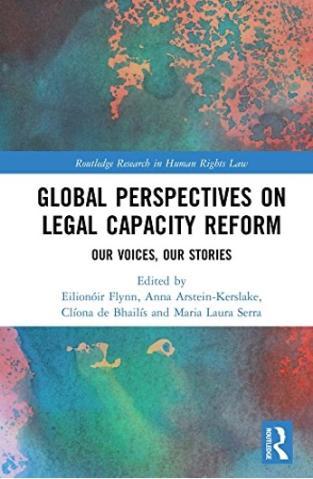
Independent Living: An Evaluation of the Áiseanna Tacaíochta Model of Direct Payments Report
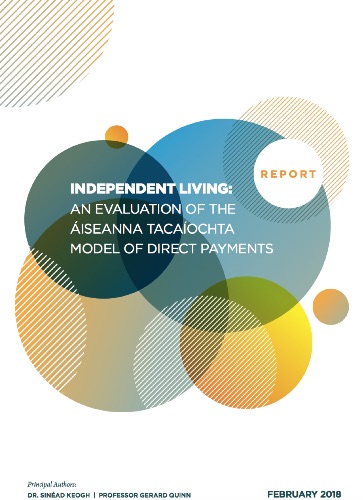
This report presents an evaluation of the experience, the costs and the benefits, both in monetary and social terms, of the Direct Payments model of individualised funding that is facilitated and supported by Áiseanna Tacaíochta (ÁT) and how this model, where the individual directs their own services, compares to the traditional dedicated service provision model. The report finds that the outcomes for persons with disabilities directing their own services with the support of ÁT reaffirm the findings of international literature that point to considerable benefits for users of direct payments, arising from greater flexibility, choice, independence, continuity of support, customizing of care packages and so forth. The report finds that the Direct Payments model of service provision facilitated by ÁT places Leaders at the centre of the decision-making process, recognises their strengths and preferences and gives them the confidence, support and means to shape the way in which their care is provided by transferring choice and control over funding decisions to them and allowing them to identify their unique individual needs. Furthermore, this research finds that the Direct Payments model of individualised funding facilitated by ÁT offers value for money through cost savings and cost efficiencies. The research indicates that there is a significant need for a policy change in Ireland and an emphasis on a change to the current model of service provision in Ireland. The full text of the report is available in PDF: Independent Living report
European Yearbook of Disability Law: Volume 5
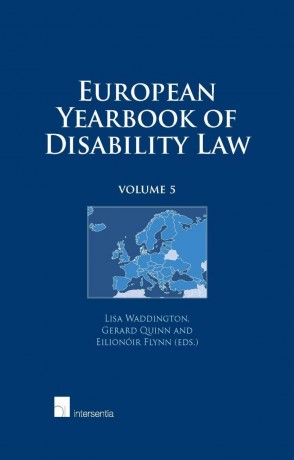
The European Yearbook of Disability Law is part of the ongoing research programme of the Maastricht Centre for Human Rights of Maastricht University and the Centre for Disability Law and Policy. Each Yearbook contains a series of articles on current challenges and developments from senior analysts and academics working in the field. It aims to provide critical insight into the evolution of European disability law and policy and offers an analysis of pressing challenges in a broad range of fields. The core consists of a review of the preceding year’s significant events, as well as a review of policy and legal developments within the institutions of the European Union. It reviews major EU policy developments, studies and other publications, legislative proposals, and case law from the Court of Justice of the European Union, and the European Court of Human Rights.
Price: €89.00
Available to buy online here.
Disabled Justice? Access to Justice and the UN Convention on the Rights of Persons with Disabilities
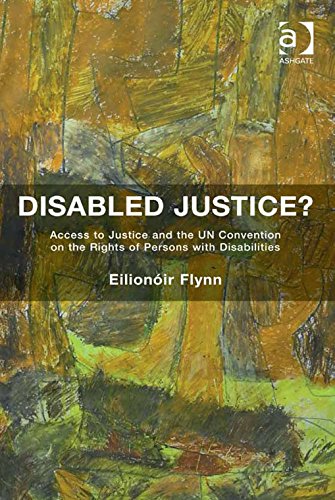
This book analyses the experience of people with disabilities through the entire justice system, from making a complaint, to investigation, and through the court/tribunal process. It also considers the participation of people with disabilities in a variety of roles in the justice system - as witness, defendant, complainant, plaintiff, lawyer, judge and juror. More broadly, it also critically examines the subtle barriers of access to justice which might exist in a given society - including barriers to grassroots disability advocacy, legal education and training, the right to vote and the right to stand for election which may apply to people with disabilities. The book is international and comparative in scope with a focus primarily on examples of legal practice and justice systems in common law countries. The work will be of interest to scholars working in the areas of human rights, equality and non-discrimination, disability rights activists and legal professionals who work with people with disabilities to achieve access to justice.
Price: £65.00
Available to buy online here.
Genetic Discrimination – Transatlantic perspectives on the case for a European-level legal response
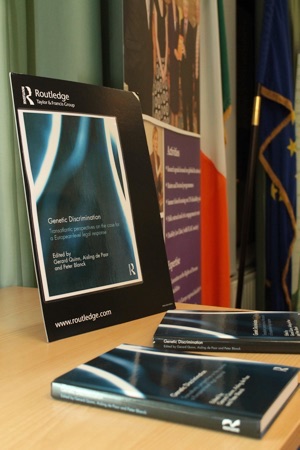
This book explores the different forms and potential uses of genetic testing. Drawing together leading experts in disability law, bioethics, health law and a range of related fields, it highlights the ethical and legal challenges arising as a result of emerging and rapidly advancing genetic science. On examining transatlantic perspectives on the matter, chapters in the book ask whether the US Genetic Information Nondiscrimination Act (GINA) is proving to be an effective tool in addressing the issue of genetic discrimination and alleviating fears of discrimination. The book also reviews what insights may be gained from GINA within employment and health insurance contexts, and asks how the UN Convention on the Rights of Persons with Disabilities (CRPD) may impact similar debates within the European Union. The book focuses particularly on the legislative and policy framework in the European Union, with an emphasis on the gaps in protection and the scope for specific legislative action in this area. This book will be of great interest to scholars and students of discrimination law, bioethics and disability law, and will be of considerable use to legal practitioners, medical practitioners and policy-makers in this area.
Price: £90.00
Available to buy online here.
Active Citizenship and Disability- Implementing the Personalisation of Support

This book provides an international comparative study of the implementation of disability rights law and policy focused on the emerging principles of self-determination and personalisation. It explores how these principles have been enshrined in the United Nations Convention on the Rights of Persons with Disabilities and how different jurisdictions have implemented them to enable meaningful engagement and participation by persons with disabilities in society. The philosophy of 'active citizenship' underpinning the Convention – that all citizens should (be able to) actively participate in the community – provides the core focal point of this book, which grounds its analysis in exploring how this goal has been imagined and implemented across a range of countries. The case studies examine how different jurisdictions have reformed disability law and policy and reconfigured how support is administered and funded to ensure maximum choice and independence is accorded to people with disabilities.
To purchase this publication, click here.
Making your decisions

Making Your Decisions is a guide to support decision making for people with intellectual disability which originated in a partnership between the National Federation of Voluntary Bodies, the Disability Law Reform module students from the LLM in Public Law, self advocates, and the parents' group, ACT. The aim was to facilitate a real learning experience for students and to translate law into real life application. The Project Team are Edel Tierney (formerly NFVB), project leader, Dr. Mary Keys and Shivaun Quinlivan, academic leaders and Public Law LLM graduates Conor Newman, Aoife O'Brien and Elaine Keane, supported by CKI.
You can download the guides separately below:
- Making Your Decisions (Contents)
- Making Your Decisions (Introduction)
- Making Your Decisions (Your Health)
- Making Your Decisions (Your Money)
- Making Your Decisions (Your Place to Live)
- Making Your Decisions (Your Relationships)
- Making Your Decisions (Your Will)
From Rhetoric to Action - Implementing the UN Convention on the Rights of Persons with Disabilities
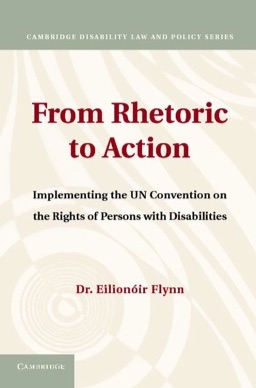
Dr. Judith Heumann officiated the launch at the Dublin Convention Centre at 4.00pm on the 20th of October 2011. The launch took place at the close of a conference co-hosted by the Centre for Disability Law and Policy and CBM Ireland, entitled: The Convention on the Rights of Persons with Disabilities - Promoting Disability Inclusion in Ireland and the World. Dr. Flynn who authored the book is the accomplished Senior Research Fellow at the Centre for Disability Law and Policy.
This book contains a global comparative study of implementation and monitoring mechanisms for national disability strategies. It comprises a comparative study that was conducted at international, regional, and comparative country levels and that highlights critical success factors in implementing disability strategies or action plans worldwide. It explores emerging synergies between what is required to implement principles of international law contained in the Convention on the Rights of Persons with Disabilities and what it is possible to achieve through national policy and systems development. A number of critical success factors for implementing and monitoring strategies are identified, including leadership from government and civil society, participation of disabled people in implementation and monitoring, transparency and accountability in reporting on progress, independent monitoring and external review, and the ability to measure progress with indicators of disability equality.
To purchase this book, please click here.
The U.N Convention on the Rights of Persons with Disabilities
The International Convention on the Rights of Persons with Disabilities is the first human rights treaty adopted by the United Nations in the 21st century. It seeks to secure the equal and effective enjoyment of human rights for the estimated 650 million persons with disabilities in the world. It does so by tailoring gerneral human rights norms to their circumstances. It reflects and advances the shift away from welfare to rights in the context of disability.
The Convention itself represents a mix between non-discrimination and other substantive human rights and gives practical effect to the idea that all human rights are indivisible and interdependent. This collection of essays examines these developments from the global, European and Scandinavian perspectives and the challenge of transposing its provisions into national law. It marks the coming of age of disabilty as a core human rights concern.
To purchase this book, please click here.
Academic Network of European Disability experts (ANED) Reports
ANED Report on the Implementation of Policies Supporting Independent Living for Disabled People in Ireland
This report examines a number of issues relevant to the theme of independent living in Ireland. The Report examines developments in Irish disability law and policy and the extent to which these developments have contributed towards providing choices for disabled people to live independently. The Report identifies progress made in Ireland towards independent community living and provides data on the percentage of persons with disabilities living in their own homes in the community and those who remain in segregated residential institutions. Information is also provided on supports available to disabled people in Ireland who wish to live in their own home, with a focus on personal assistance services and assistive equipment and adaptations. The full text of the report is available in PDF.
ANED Report on the Social Inclusion and Social Protection of Disabled People in Ireland
This report examines a number of issues relevant to the social inclusion and social protection of people with disabilities in Ireland. The report outlines the legal and policy framework for the social inclusion of persons with disabilities in Ireland and identifies the most recent research undertaken on the issue. The report focuses on a number of key issues including the incomes, pensions, benefits and supports available to people with disabilities in Ireland. The full text of the report is available in PDF.
ANED Report on the Employment of Disabled People in Ireland
This report examines a number of issues relevant to employment and disability. The report identifies key Irish publications and research in the area and reviews relevant employment statistics and trends. The report highlights the most significant Irish law and policy addressing the issue of employment and disability and provides information on supported employment and sheltered employment in Ireland. The report also provides practical examples, identified from case law, of reasonable accommodation in the workplace. The full text of the report is available in PDF

